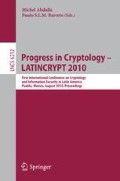Abstract
Broadcast (BC) is considered as the most fundamental primitive for fault-tolerant distributed computing and cryptographic protocols. An important and practical variant of BC is Asynchronous BC (known as A-cast). An A-cast protocol enables a specific party called sender (possibly corrupted) to send some message identically to a set of parties despite the presence of an adversary who may corrupt some of the parties in a malicious manner.
Though the existing protocol for A-cast is designed for a single bit message, in real life applications typically A-cast is invoked on long message (whose size can be in gigabytes) rather than on single bit. Therefore, it is important to design efficient multi-valued A-cast protocols (i.e protocols with long message) which extract several advantages offered by directly dealing with long messages and are far better than multiple invocations to existing protocols for single bit. In this paper, we design highly efficient, communication optimal, optimally resilient multi-valued A-cast protocol for long messages, based on access to the existing A-cast protocol for short messages. Our protocol also provides better communication complexity than existing protocol for A-cast.
Access this chapter
Tax calculation will be finalised at checkout
Purchases are for personal use only
Preview
Unable to display preview. Download preview PDF.
References
Ben-Or, M.: Another Advantage of Free Choice: Completely Asynchronous Agreement Protocols. In: PODC, pp. 27–30. ACM Press, New York (1983)
Ben-Or, M., Canetti, R., Goldreich, O.: Asynchronous Secure Computation. In: STOC, pp. 52–61. ACM Press, New York (1993)
Ben-Or, M., Goldwasser, S., Wigderson, A.: Completeness Theorems for Non-Cryptographic Fault-Tolerant Distributed Computation (Extended Abstract). In: STOC, pp. 1–10. ACM Press, New York (1988)
BenOr, M., Kelmer, B., Rabin, T.: Asynchronous Secure Computations with Optimal Resilience. In: PODC, pp. 183–192. ACM Press, New York (1994)
Bracha, G.: An Asynchronous \(\lfloor (n - 1) / 3 \rfloor\)-resilient Consensus Protocol. In: PODC, pp. 154–162. ACM Press, New York (1984)
Bracha, G., Toueg, S.: Asynchronous Consensus and Broadcast Protocols. J. ACM 32(4), 824–840 (1985)
Canetti, R.: Studies in Secure Multiparty Computation and Applications. PhD thesis, Weizmann Institute, Israel (1995)
Chaum, D., Crpeau, C., Damgård, I.: Multiparty Unconditionally Secure Protocols (Extended Abstract). In: STOC, pp. 11–19. ACM Press, New York (1988)
Chor, B., Goldwasser, S., Micali, S., Awerbuch, B.: Verifiable Secret Sharing and Achieving Simultaneity in the Presence of Faults (Extended Abstract). In: STOC, pp. 383–395. ACM Press, New York (1985)
Cramer, R., Damgård, I., Dziembowski, S., Hirt, M., Rabin, T.: Efficient Multiparty Computations Secure Against an Adaptive Adversary. In: Stern, J. (ed.) EUROCRYPT 1999. LNCS, vol. 1592, pp. 311–326. Springer, Heidelberg (1999)
Dolev, D., Dwork, C., Waarts, O., Yung, M.: Perfectly Secure Message Transmission. JACM 40(1), 17–47 (1993)
Fischer, M.J.: The Consensus Problem in Unreliable Distributed Systems (A Brief Survey). In: FCT, pp. 127–140 (1983)
Fitzi, M.: Generalized Communication and Security Models in Byzantine Agreement. PhD thesis, ETH Zurich (2002)
Fitzi, M., Hirt, M.: Optimally Efficient Multi-valued Byzantine Agreement. In: PODC, pp. 163–168. ACM Press, New York (2006)
Garey, M.R., Johnson, D.S.: Computers and Intractability: A Guide to the Theory of NP-Completeness. W.H. Freeman, New York (1979)
Lynch, N.A.: Distributed Algorithms. Morgan Kaufmann, San Francisco (1996)
Pease, M., Shostak, R.E., Lamport, L.: Reaching Agreement in the Presence of Faults. JACM 27(2), 228–234 (1980)
Rabin, M.O.: Randomized Byzantine Generals. In: FOCS, pp. 403–409. IEEE Computer Society Press, Los Alamitos (1983)
Turpin, R., Coan, B.A.: Extending Binary Byzantine Agreement to Multivalued Byzantine Agreement. Information Processing Letters 18(2), 73–76 (1984)
Author information
Authors and Affiliations
Editor information
Editors and Affiliations
Rights and permissions
Copyright information
© 2010 Springer-Verlag Berlin Heidelberg
About this paper
Cite this paper
Patra, A., Rangan, C.P. (2010). Communication Optimal Multi-valued Asynchronous Broadcast Protocol. In: Abdalla, M., Barreto, P.S.L.M. (eds) Progress in Cryptology – LATINCRYPT 2010. LATINCRYPT 2010. Lecture Notes in Computer Science, vol 6212. Springer, Berlin, Heidelberg. https://doi.org/10.1007/978-3-642-14712-8_10
Download citation
DOI: https://doi.org/10.1007/978-3-642-14712-8_10
Publisher Name: Springer, Berlin, Heidelberg
Print ISBN: 978-3-642-14711-1
Online ISBN: 978-3-642-14712-8
eBook Packages: Computer ScienceComputer Science (R0)

